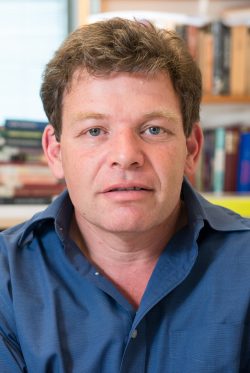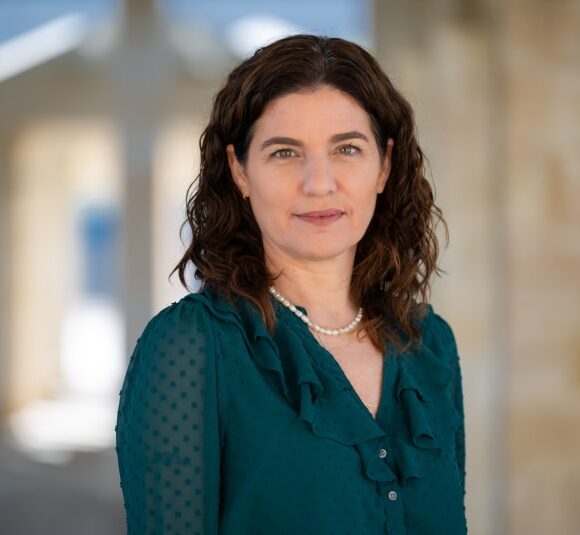
BGU Rector: The Road Less Traveled
BGU Rector: The Road Less Traveled
January 3, 2021
Leadership, Awards & Events, Social Sciences & Humanities
The Jerusalem Post — Prof. Chaim Hames “took the road less traveled and that has made all the difference.” Today, he is the rector [provost] of Ben-Gurion University of the Negev.
Hames grew up in a religious-Zionist family in London, the oldest of three children. When he was 12 years old, his father, a property manager, and mother, an editor, decided to make aliyah. Chaim was sent the year before to a school somewhat less Orthodox than that attended by his friends, in order to learn spoken, not biblical, Hebrew.

Prof. Chaim Hames
“The idea was a good one, but it didn’t really work,” laughs Hames unabashedly.
The family landed at the Mevaseret Zion Absorption Center for five months and then moved permanently to Petah Tikva. Hames went to Midrashiyat Noam, a religious high school.
“I may not have been able to speak Hebrew, but what saved me was my soccer skills,” he recalls. “Everyone wanted me on their team, and nine months later I was fully integrated. I’ve never looked back.”
The transition was harder for Hames’s parents, and he greatly admires them for their perseverance in remaining in the country when many of their friends returned to England. He says that his late father, Alan, never quite got the Israeli work mentality, but religiously, socially and culturally he felt that making aliyah was the best thing he ever did.
His mother, Reba, went on to become a highly accomplished English teacher at Seminar Hakibbutzim State Teachers College and the Open University.
Following high school, Hames studied briefly at a yeshiva and then did his three-year mandatory army service. Immediately upon completing his service, he went to The Hebrew University of Jerusalem, majoring in history and international relations.
Here Hames’s story diverges from the familiar trajectory he was on. After his first year at university, unsure about what he really wanted to do, Hames took off for the Far East.
“Unlike today, there were not many Israelis backpacking through this region,” he says.
From the Far East he made his way to Australia and New Zealand and then on to the United States from the West Coast to the East. He returned to Hebrew University, received his degree in general history and went on to get his Ph.D. in medieval history at Cambridge University.
Hames says he chose this subject because he was “fascinated by how ideas move back and forth between cultures and religion, and I was interested in the relationship between Judaism, Christianity and Islam.”
Alongside his intellectual journey, Hames was immersed in a religious journey as well and decided to train as a Reform rabbi.
“But man plans and God laughs,” says Hames good-naturedly. He received a job offer to become a lecturer at Ben-Gurion University, and he chose this path.
It was October 1995, and Hames distinctly recalls that there were only 7,000 students and some 400 academics at BGU. Beer-Sheva was more a provincial town than a growing metropolis.
“It is amazing the growth of the University and the city,” he says. “Today, there are close to 20,000 students and 900 academics. Beer-Sheva is thriving locally and internationally, attracting the best talent and becoming a high-tech powerhouse.”
Hames married in 1997, briefly lived in Jerusalem, and then the couple moved to Beer-Sheva.
“My wife is from Beer-Sheva, but I wanted to live there for ideological reasons, to build the Negev and to help this important region flourish and advance,” he says.
Since joining BGU, Hames has held a number of positions, from chairman of the Department of General History to dean of the Faculty of Humanities and Social Sciences to his appointment as rector in 2018. He is the first rector to come from the humanities.
His research interests are varied, ranging from medieval and Renaissance Jewish, Christian and Muslim mysticism and philosophy, apocalypticism, interreligious polemics, Bible and Talmud translations, and issues dealing with religious conversion.
In 2013, he set up the Center for the Study of Conversion and Interreligious Encounters at BGU.
“Conversion especially interests me,” he says. “Not the act itself, but its ramifications – how it creates the transfer of knowledge and ideas and affects the individual, family and community.”
He has published extensively throughout his career, including “The Art of Conversion: Christianity and Kabbalah in the Thirteenth Century” and “Like Angels on Jacob’s Ladder: Abraham Abulafia, the Franciscans and Joachimism.”
He has also written a book in Hebrew for a more general audience dealing with Judaism in contemporary Israel, “I (do not) Believe: Judaism and Israel, Past, Present Future,” which ends with his version of the “13 principles of faith” – what he feels Israel should be like in terms of its Judaism.
Hames, who as rector is academic head of BGU, looks back on the University’s past 50 years and is proud of its humble beginnings in the middle of the desert and the incredible growth it has spearheaded not only academically but locally and regionally.
“The next 50 years will see BGU continue to drive local growth while expanding and becoming an important player in the global arena,” he says.
“I am proud to do my part in this.”



